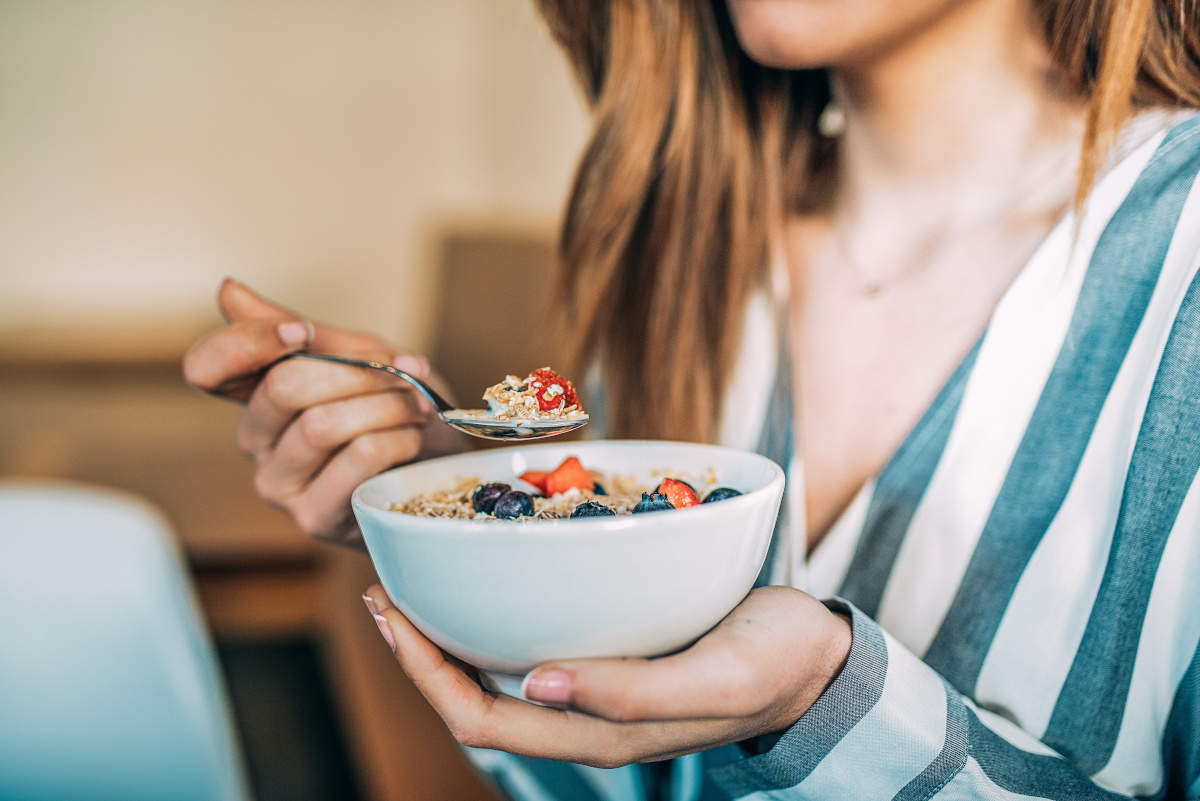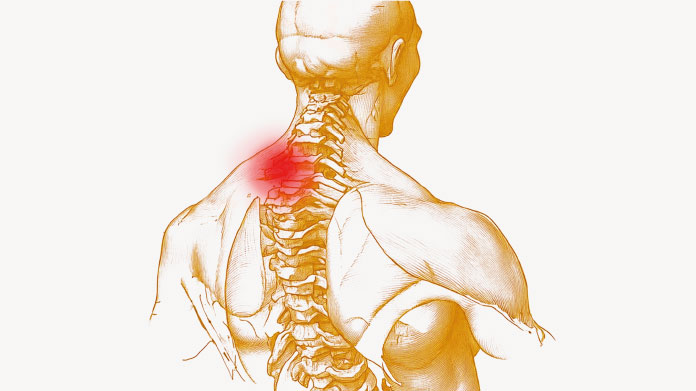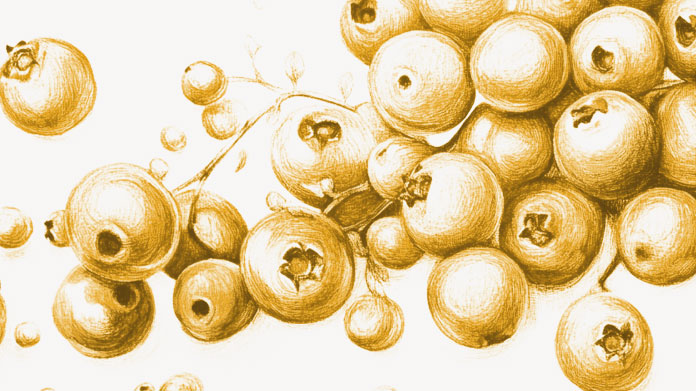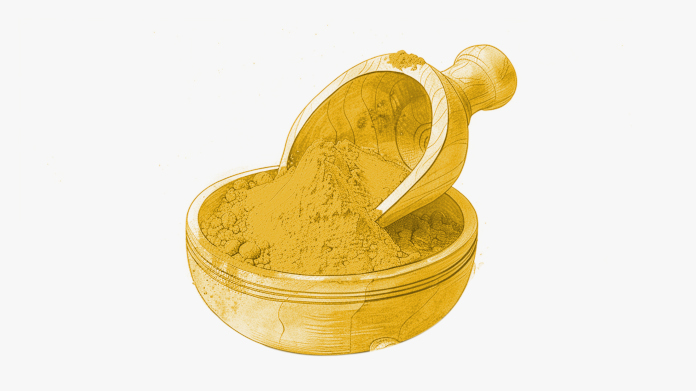Anti-inflammatory breakfast: healthy recipes to get the day off to a good start
The fight against chronic inflammation begins as soon as you get up in the morning! Discover the best foods to eat for a top-notch breakfast.

Why choose an anti-inflammatory breakfast?
Inflammation is initially a beneficial process: it’s the way in which the immune system responds to external aggressors (viruses, bacteria, allergens, injuries …) in order to maintain its integrity.
But when it becomes established over the longer term, it becomes problematic: this is referred to as chronic inflammation. Insidious and often silent, it is intrinsically linked to various health issues such as metabolic disorders, cardiovascular problems and auto-immune diseases (1-3).
It’s now recognized that diet has an effect on how inflammatory mechanisms behave. Breakfast, quite literally ‘breaking the (overnight) fast’, is an opportunity to recharge your batteries healthily, and set the right tone for your immune defenses (4). So it obviously makes sense to play the right notes!
Inflammatory foods to avoid in the morning
The worst culprit of all? Refined sugar. Apart from being devoid of nutrients, it can affect the permeability of the intestinal barrier and alter microbiota diversity, which we now know is linked to immunity (5). So try to have a breakfast with no added sugar.
Highly-processed foods (biscuits, pastries, sliced bread…) aren’t much better. And sugar isn’t the only offender here: the additives they contain, especially certain emulsifiers, can also interfere with gut flora (6).
What about white bread? Though it adds a little crunch to breakfast when lightly toasted, it gets the thumbs down from nutritionists (7). With a high glycaemic index (of between 70 and 80), it acts more or less like a fast-release carb. As for the butter and highly-processed spreads that go with it, their saturated fat content may well maintain certain inflammatory markers (8).
Anti-inflammatory diet experts also recommend reducing your intake of certain allergens, such as peanuts, wheat, soya, cow’s milk and eggs. There’s no need to exclude them all the time – make your own decision based on how well you tolerate these foods.
Anti-inflammatory foods to prioritise
A source of vitamins, minerals and antioxidants, fresh fruit should feature in any breakfast aimed at fighting inflammation (9). While all fruits have something to offer here, those of particular benefit include red berries, citrus fruit, mangoes and kiwi, the colored flesh of which reflects a high content of protective compounds. Eat the whole, fresh fruit rather than just its juice so that you get maximum benefit from its satisfying fibre content.
Though not the most appetising of foods when you’ve just got out of bed, leafy green vegetables are full of health benefits. Among the most alkalinising, spinach is recommended by naturopaths for countering acidity in the body (10). And it can be easily blended, unnoticed, into a fruit smoothie!
Combining mineral salts, sitosterol and flavonoids, nettles are a nutritional treasure trove. The caffeoylmalic acid they contain has an anti-inflammatory effect confirmed by the EFSA (11). Nettles can be consumed as a dried powder. The slightly grassy taste is quite subtle and melds easily into a green juice or herbal tea. Apart from its leaves, the plant’s root also features in certain supplements (such as Nettle Root Extract, which, for the men out there, is also good for prostate health).
A small root with bright orange flesh, turmeric exerts an anti-inflammatory effect as a result of its curcuminoids, a benefit confirmed by the EFSA (12-13). Give it pride of place at the breakfast table by making a re-energising golden latte, the Indian equivalent of our hot toddy: mix turmeric with some coconut milk, cinnamon, ginger, a pinch of pepper and a drizzle of honey. You can also increase your intake with turmeric supplements (for example Natural Curcuma, standardized to 95% curcuminoids for maximum efficacy).
Ginger also has anti-inflammatory properties listed by the EFSA, due partly to its content of gingerols (14-15). Steeped in water and lemon, this spicy root makes an invigorating juice which is perfect for getting the day off to a flying start. If you want to get maximum benefit from gingerols without the ‘throat burn’, then opt instead for a ginger extract supplement (such as Super Gingerols, standardized to 20% gingerols).
If you can’t do without a slice of bread or toast in the morning, at least choose sourdough! The fact that it’s fermented makes it more digestible with better nutrient absorption. It also has a lower GI (around 65), which is always good for reducing chronic inflammation (16-17). And bread made with dark or wholemeal flour is a must, preferably low-gluten too, to protect sensitive stomachs (try small spelt). If you normally have a bowl of cereal, swap your cornflakes for oat flakes, the beta-glucan content of which continues to attract scientific interest (18).
And finally, don’t forget about omega-3s to even out any imbalance with omega-6, an excess of which can be pro-inflammatory (19-20). They’re found in flax, chia and hemp seeds, as well as in walnuts.
3 recipes for an anti-inflammatory breakfast
Recipe 1: the Continental revisited
2 slices of sourdough bread + nut butter
+ 1 sheep’s milk yogurt
+ 1 small bowl of strawberries
+ 1 turmeric-ginger chai
Recipe 2 : the muesli inflammation special
50g-60g of oat flakes + 1 tbsp of chia seeds + 1 tbsp of goji berries + 5 walnuts + 1 diced kiwi fruit + 125 ml of almond milk
+ 1 lemon-ginger green tea
Recipe 3: the savory brunch
1 buckwheat galette + spinach and turmeric omelette (2 eggs + 100g of baby spinach + ½ tsp of turmeric + salt + pepper) + a few cherry tomatoes
+ 1 light green tea
An all-in-one dietary supplement to start your day off on the right foot
As it’s not always easy to resist the temptation of a warm croissant, you can still up your intake of substances good for inner balance by taking an appropriate synergistic supplement (combining turmeric, ginger and other antioxidants like tulsi, the powerful formulation InflaRelief is the perfect breakfast boost) (21).
References
- Ellulu MS, Patimah I, Khaza'ai H, Rahmat A, Abed Y. Obesity and inflammation: the linking mechanism and the complications. Arch Med Sci. 2017;13(4):851-863. doi:10.5114/aoms.2016.58928
- Sorriento D, Iaccarino G. Inflammation and Cardiovascular Diseases: The Most Recent Findings. Int J Mol Sci. 2019;20(16):3879. Published 2019 Aug 9. doi:10.3390/ijms20163879
- Duan L, Rao X, Sigdel KR. Regulation of Inflammation in Autoimmune Disease. J Immunol Res. 2019;2019:7403796. Published 2019 Feb 28. doi:10.1155/2019/7403796
- Zhu S, Cui L, Zhang X, Shu R, VanEvery H, Tucker KL, Wu S, Gao X. Habitually skipping breakfast is associated with chronic inflammation: a cross-sectional study. Public Health Nutr. 2021 Jul;24(10):2936-2943. doi: 10.1017/S1368980020001214. Epub 2020 Jun 25. PMID: 32583754.
- Fajstova A, Galanova N, Coufal S, et al. Diet Rich in Simple Sugars Promotes Pro-Inflammatory Response via Gut Microbiota Alteration and TLR4 Signaling. Cells. 2020;9(12):2701. Published 2020 Dec 16. doi:10.3390/cells9122701
- Paula Neto HA, Ausina P, Gomez LS, Leandro JGB, Zancan P, Sola-Penna M. Effects of Food Additives on Immune Cells As Contributors to Body Weight Gain and Immune-Mediated Metabolic Dysregulation. Front Immunol. 2017;8:1478. Published 2017 Nov 6. doi:10.3389/fimmu.2017.01478
- Masters RC, Liese AD, Haffner SM, Wagenknecht LE, Hanley AJ. Whole and refined grain intakes are related to inflammatory protein concentrations in human plasma. J Nutr. 2010;140(3):587-594. doi:10.3945/jn.109.116640
- Milanski M, Degasperi G, Coope A, et al. Saturated fatty acids produce an inflammatory response predominantly through the activation of TLR4 signaling in hypothalamus: implications for the pathogenesis of obesity. J Neurosci. 2009;29(2):359-370. doi:10.1523/JNEUROSCI.2760-08.2009
- Holt EM, Steffen LM, Moran A, et al. Fruit and vegetable consumption and its relation to markers of inflammation and oxidative stress in adolescents. J Am Diet Assoc. 2009;109(3):414-421. doi:10.1016/j.jada.2008.11.036
- Roberts JL, Moreau R. Functional properties of spinach (Spinacia oleracea L.) phytochemicals and bioactives. Food Funct. 2016 Aug 10;7(8):3337-53. doi: 10.1039/c6fo00051g. Epub 2016 Jun 29. PMID: 27353735.
- Hajhashemi V, Klooshani V. Antinociceptive and anti-inflammatory effects of Urtica dioica leaf extract in animal models. Avicenna J Phytomed. 2013;3(2):193-200.
- Jurenka JS. Anti-inflammatory properties of curcumin, a major constituent of Curcuma longa: a review of preclinical and clinical research. Altern Med Rev. 2009 Jun;14(2):141-53. Erratum in: Altern Med Rev. 2009 Sep;14(3):277. PMID: 19594223.
- Hewlings SJ, Kalman DS. Curcumin: A Review of Its Effects on Human Health. 2017;6(10):92. Published 2017 Oct 22. doi:10.3390/foods6100092
- Morvaridzadeh M, Fazelian S, Agah S, Khazdouz M, Rahimlou M, Agh F, Potter E, Heshmati S, Heshmati J. Effect of ginger (Zingiber officinale) on inflammatory markers: A systematic review and meta-analysis of randomized controlled trials. 2020 Nov;135:155224. doi: 10.1016/j.cyto.2020.155224. Epub 2020 Aug 5. PMID: 32763761.
- Mashhadi NS, Ghiasvand R, Askari G, Hariri M, Darvishi L, Mofid MR. Anti-oxidative and anti-inflammatory effects of ginger in health and physical activity: review of current evidence. Int J Prev Med. 2013;4(Suppl 1):S36-S42.
- Da Ros A, Polo A, Rizzello CG, Acin-Albiac M, Montemurro M, Di Cagno R, Gobbetti M. Feeding with Sustainably Sourdough Bread Has the Potential to Promote the Healthy Microbiota Metabolism at the Colon Level. Microbiol Spectr. 2021 Dec 22;9(3):e0049421. doi: 10.1128/Spectrum.00494-21. Epub 2021 Dec 1. PMID: 34851178; PMCID: PMC8668080.
- Pagliai G, Venturi M, Dinu M, Galli V, Colombini B, Giangrandi I, Maggini N, Sofi F, Granchi L. Effect of consumption of ancient grain bread leavened with sourdough or with baker's yeast on cardio-metabolic risk parameters: a dietary intervention trial. Int J Food Sci Nutr. 2021 May;72(3):367-374. doi: 10.1080/09637486.2020.1799956. Epub 2020 Jul 27. PMID: 32718191.
- Kim SJ, Jung CW, Anh NH, et al. Effects of Oats (Avena sativa L.) on Inflammation: A Systematic Review and Meta-Analysis of Randomized Controlled Trials. Front Nutr. 2021;8:722866. Published 2021 Aug 27. doi:10.3389/fnut.2021.722866
- Reifen R, Karlinsky A, Stark AH, Berkovich Z, Nyska A. α-Linolenic acid (ALA) is an anti-inflammatory agent in inflammatory bowel disease. J Nutr Biochem. 2015 Dec;26(12):1632-40. doi: 10.1016/j.jnutbio.2015.08.006. Epub 2015 Aug 14. PMID: 26350254.
- Patterson E, Wall R, Fitzgerald GF, Ross RP, Stanton C. Health implications of high dietary omega-6 polyunsaturated Fatty acids. J Nutr Metab. 2012;2012:539426. doi:10.1155/2012/539426
- Cohen MM. Tulsi - Ocimum sanctum: A herb for all reasons. J Ayurveda Integr Med. 2014;5(4):251-259. doi:10.4103/0975-9476.146554
Keywords
4 Days
Quick shipping
Quick shipping; good price. No issues!
Mary McCarty
5 Days
Thr product is very good and is helping…
Thr product is very good and is helping me on my health. Then is always on time
LUGO Luz
8 Days
Buying was fine
Buying was fine. I had problems with the website not recognizing my login info, and had to call to get it fixed. Other than that, everything was good.
David S. Clark
8 Days
Your super maca and super ginseng are…phenomenal
Your super maca and super ginseng are phenomenal supplements that compliment each other when taking them together. Fantastic feeling of well-being and lots of mid day energy without the crash.
Keith Mason
11 Days
I have had amazing results with every…
I have had amazing results with every supplement I've purchased. I am extremely satisfied with this company
kirstin Torres
11 Days
Fine products
Fine products . They are on the leading edge of online supplements. The only issue -so far-is they sometime run out of subscription items.
Jason Argos
13 Days
The ordering process is very user…
The ordering process is very user friendly and the products always come in a timely manner.
CARTER Rhonda
15 Days
The price for Dr
The price for Dr. Pero's AC-11 is reasonable and in line with his views. (my former colleague). Keep it pure.
CAMPBELL Clayton
17 Days
Right on every time.
Right on every time.
Arthur Nicholas
20 Days
They are cheaper than everyone else and…
They are cheaper than everyone else and the shipping was fast. Great company.
Patricia Adams
27 Days
Availability of quality health…
Availability of quality health supplements and it's wide variety is impressive. Ordering is seamless and shipping even during the holidays is well streamlined.
Mohamad Hussein
41 Days
A Product worth waiting for when not…
A Product worth waiting for when not available and then arriving as a surprise!
DOMINIC
43 Days
On time shipping
On time shipping
GEORGE Verne
45 Days
Ordering was easy and the product was…
Ordering was easy and the product was delivered with no problems. Appreciated that I was notified when it would arrive. Thanks!
MascarC
50 Days
Great customer service - responsive …
I ordered from them and my item was unavailable for sometime. I was super happy when they reactivated my order and shipped my item which arrived very quickly. Great customer service.
Ruth Rueter




